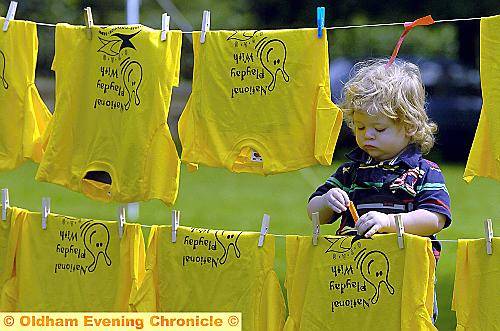Why play time is vital for children
Reporter: Karen Doherty
Date published: 21 September 2009

PLAYING house . . . Toddler George Starkey pegs out newly-printed T-shirts during Oldham’s Playday celebration in Werneth Park
MORE than 800 events took place across the UK recently to make this year’s National Playday the biggest yet.
It’s theme “make time” highlighted that children have the right to play and need time and space to play. Karen Doherty found out more.
SPENDING hours riding a bike, climbing trees and exploring your neighbourhood are no longer part of everyday life for many children.
Fears about busy roads, paedophiles lurking around corners and health and safety are all having an impact on an essential part of growing up: play and in particular outdoor play.
But according to Steph Gill, co-ordinator of Oldham Play Action Group (OPAG), some of these are unfounded.
“I thinks fears about traffic are true, but some of the other are down to more widespread reporting,” says Steph.
It is OPAG’s mission to spread the world about the benefits of play. Set up in 1977 by a small band of parents, it has expanded from a front room to its base at Greenacres Community Centre.
Four staff and a pool of casual people — from artists to former childcare workers — work with up to 3,000 children.
As well as supporting around 40 community, voluntary and faith groups, it runs a range of activities such as junior youth clubs and the Lottery-funded adventures in play sessions in Oldham’s green spaces.
They also organised this year’s Playday event in Werneth Park, part of Play England’s annual celebration of children’s right to play. .
And if new research published to coincide with Playday is anything to go by, OPAG’s work is more essential than ever.
More than half of adults (52 per cent) feel that work and other commitments limit their time to help their children play. And this is made worse by the fact that half of parents say there aren’t enough places for children to play safely without an adult.
Children are also facing pressures on their time too, with homework and extra-curricular activities cutting heavily into their free time.
Being denied time to play makes children bored, unhappy and miss their friends. And Parents said that children are naughty (72 per cent) and angry (62 per cent) if they haven’t had enough time to play.
“Not playing denies children a basic opportunity to socialise, to develop physically and emotionally,” explained Steph. “It isn’t merely passing the time, it is actually children developing and growing and becoming people.”
The research also found that nearly a half of adults (47 per cent) think children should go to fewer extra-curricular activities.
When asked what should happen for children to have more time to play, 73 per cent of adults (increasing to 76 per cent of parents) would like more places where children can go and play independently.
Steph agreed that things such as homework clubs, music lessons and other structured activities were great for a lot of children.
But she added: “As adults we do not want the whole of our leisure time to be structured. Children do need time to do things that are more open-ended, to discover things.
“That’s the beauty of most of what we offer. There’s time to experiment, find your way and learn from your mistakes by doing things. You do not always know where you are going to go when a child’s imagination kicks in!”
This summer there has been no shortage of opportunities for children to get out and play, with hundreds of activities going on across the borough through Passport to Summer, Oldham’s programme of more than 800 fun events.
Oldham’s award-wining parks are also a magnet for families, boasting a range of attractions — from a paddling pool to pitch and putt.
Parks boss Steve Smith thinks visits this summer were up 20 to 25 per cent on last year and added: “There are a lot of facilities which we are adding to. We have got the Play Builder programme where we are refurbishing 22 of the play areas over the next two years.”




